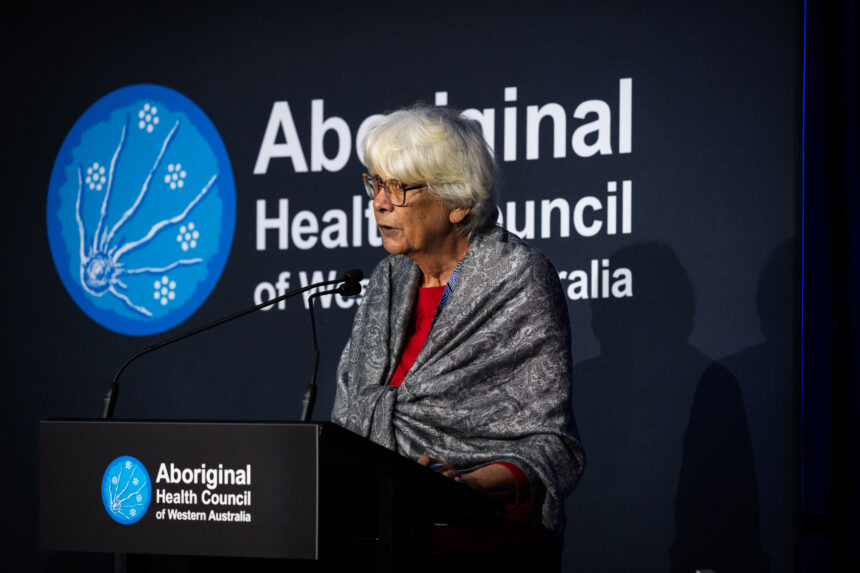Aboriginal health leaders at this year’s Aboriginal Community Controlled Health Sector Conference have raised concerns about the lack of investment in implementing the National Agreement on Closing the Gap. They noted a disappointing disparity between the commitment to Closing the Gap by the WA Government in their recent State Budget with what was handed down in New South Wales and Victoria. However, it was acknowledged that there were Election commitments made before the Election which were honoured.
In her Keynote Address on Wednesday, National Aboriginal Community Controlled Health Organisation (NACCHO) Chief Executive Pat Turner AM stated that governments have been slow to implement their commitments and continue to struggle to fully grasp the depth of change required.
“Unchallenged, the apparatus of government is ill-designed to achieve our peoples’ rights,” Ms Turner said. “The perpetual process of marginalisation and exclusion of Aboriginal and Torres Strait Islander peoples from decisions that affect them should be top of mind for all of us.”
Aboriginal Health Council of Western Australia (AHCWA) Chair, Vicki O’Donnell OAM, highlighted the Sector’s leadership over the past year developing a contemporary Aboriginal Environmental Health Model of Care. Designed as a blueprint to achieving equity in health outcomes by addressing preventable environmental health conditions, the Model of Care remains unfunded in last month’s State Budget.
“The Government has an obligation to fund Closing the Gap initiatives,” Ms O’Donnell said. “This is important. We need it in every region, we need it in every town, we need it in every community.”
Ms O’Donnell congratulated Premier Roger Cook on his re-election and for progressing the Stolen Generations Redress Scheme; and acknowledged the WA Government’s trial changes aimed at improving access to St John WA ambulance services for Aboriginal people in the State.
She emphasised that the transition of funding to Aboriginal community control was a significant milestone that reflected long-standing advocacy by our communities for greater control over health services and outcomes.
“It is not just about transferring services, it is about transferring power, decision-making and resourcing to our communities so that services are responsive, effective and culturally secure,” she said.
Ms Turner reaffirmed that the Priority Reforms within the National Agreement on Closing the Gap offer a clear and practical framework for government action on Closing the Gap, but noted they require structural change to the way governments work with Aboriginal and Torres Strait Islander peoples.
“The recent Independent Aboriginal and Torres Strait Islander- Led Review of Closing the Gap found a profound imbalance of responsibilities and resourcing between Aboriginal and Torres Strait Islander peoples, and the government signatories to the National Agreement,” she said.
Under the multi-billion dollar National Health Reform Agreement (NHRA), which seeks to align the Commonwealth, States and Territories under a unified vision for hospitals, both AHCWA and NACCHO challenged governments to identify and eliminate racism in their hospitals; embed and practice meaningful cultural safety; commit to delivering services in partnership with Aboriginal and Torres Strait Islander organisations; increase accountability through transparent funding; and support Aboriginal and Torres Strait Islander cultures.
The annual West Australian Aboriginal Community Controlled Health Sector Conference draws together healthcare professionals working across 23 Member Aboriginal Community Controlled Health Services, their directors, and those working more generally in Aboriginal health throughout Australia. A key health sector event, the conference fosters collaboration, knowledge sharing, and innovation to drive improved health and wellbeing outcomes for Aboriginal people and their communities.
This year’s conference keynote presentations included WA Minister for Health and Mental Health, the Hon. Meredith Hammat MLA on the WA Government’s commitments with regard to Aboriginal health in our State; and former Aboriginal and Torres Strait Islander Social Justice Commissioner Uncle Mick Gooda, who presented on understanding and responding to lateral violence. Wise Group’s Director of Health Equity Hine Martin reflected on resistance to the recent Treaty Principles Bill and the Regulatory Standards Bill – two pieces of legislation proposed by the ACT Party in her home of Aotearoa, both of which have seen unprecedented opposition and protest from Māori and non-Māori. The Conference also launched AHCWA’s new COVID-19 Response Review, which catalogues the experience of our ACCHS throughout the COVID-19 pandemic, offering compelling analysis of our State’s pandemic plans as they relate to the specific needs of Aboriginal people; and hosted Australian rules football midfielder Tim Kelly, who shared insights about his motivation and cultural advocacy.

